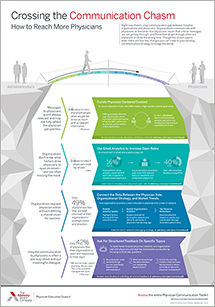Auto logout in seconds.
Continue LogoutEditor's note: This popular story from the Daily Briefing's archives was republished on Aug. 24, 2018.
A new study from the University of Pennsylvania's Wharton School, published in the journal Organizational Behavior and Human Decision Processes, shows that trash talk can help you perform better—but only on certain tasks, Elizabeth Bernstein writes for the Wall Street Journal.
Study details
Researchers at the Wharton School performed six experiments involving approximately 1,000 participants, who were told they'd be paired up to compete against another person in a task. One person in each pair was actually a researcher, but the participants weren't informed of that fact.

Cross the communication chasm: How to reach more physicians
Before they began their task, participants were asked to chat with their partner online. Some participants received neutral messages from their partners, such as, "Hey, it looks like we will be competing against each other in the next task." Others received trash-talk statements such as, "You are a total loser."
The participants in the study would then perform their assigned tasks, some of which measured persistence while others measured creativity or the ability to work well as a team.
In one study, for instance, participants performed a "slider task" that required them to move a cursor on a computer quickly towards a targeted number. In another task, participants tackled a "candle problem" in which they received several supplies—a candle, a pack of matches, and a box of tacks—and were asked to come up with a way to attach the candle to the wall without letting it drip on the table or floor below. This task measured creativity.
The researchers told all of the participants that they could win money.
Results
The researchers discovered that trash talk's effect on participants varied depending on the task they were asked to complete.
For participants whose tasks required them to exert extra effort, trash talk actually helped. These participants reported feeling more rivalry—although they also were more likely to cheat.
But for tasks that measured creativity or required participants to work with a partner, trash talk led to worse performance—possibly due to the distraction created by anger.
Both men and women reacted similarly when confronted with trash talk.
Tips on giving and receiving trash talk
According to Bernstein, the study has implications both for people who give trash talk and for those who receive it.
For those giving trash talk:
- Recognize the consequences. Jeremy Yip, an assistant professor of management at Georgetown University and lead researcher on the studies, said, "Ask yourself how you would react if someone trash talked you. If you step back and think about it, you will see that being called a loser is going to motivate you as competitor."
- Consider your personality. "Trash talk requires a certain brashness that not everyone has, and, as in tennis, you have to be ready for the return shot," said Daniel McGinn, a senior editor at the Harvard Business Review and author of "Psyched up: How the Science of Mental Preparation Can Help you Succeed." "The recipient is often going to try and give better than he or she gets."
- Choose your target well. As the research indicates, trash talk is most effective at disrupting opponents who have creative responsibilities. Bernstein writes, "Trash talk the quarterback to distract him, not the defensive tackle."
- Don't trash talk your teammates. Per the Wharton School's studies, doing so can turn your teammates into your rivals.
For those receiving trash talk:
- Don't take it personally. Bernstein writes that communication norms are different in the world of competition, and aggressive talk is commonplace.
- Know yourself. Some people can best respond to trash talk by ignoring it entirely, while others will do best to respond with trash talk of your own. "I see a parallel between how one deals with trash talk and how a comedian deals with a heckler," said McGinn. "Personality is important."
- Try ignoring it. You don't have to respond to everything. "Just because you see a log floating down the river doesn't mean you need to jump on it," said Warren Kennaugh, a behavioral strategist and executive coach in Sydney, Australia.
- Motivate yourself. Bernstein writes that you should remember the trash talk you receive and use it as motivation by finding ways to prove the naysayers wrong (Bernstein, Wall Street Journal, 7/5).
Get the resources for motivating your staff year-round
Here, you'll find all the best practices for ensuring individual performance goals motivate staff year-round, including example templates and the answers to frequently asked questions:
- Scripps Health's Success Shares FAQs
- Employee Compensation FAQs
- Goal-Focused Leader Check-in Template
Get all the Resources
Don't miss out on the latest Advisory Board insights
Create your free account to access 1 resource, including the latest research and webinars.
Want access without creating an account?
You have 1 free members-only resource remaining this month.
1 free members-only resources remaining
1 free members-only resources remaining
You've reached your limit of free insights
Become a member to access all of Advisory Board's resources, events, and experts
Never miss out on the latest innovative health care content tailored to you.
Benefits include:
You've reached your limit of free insights
Become a member to access all of Advisory Board's resources, events, and experts
Never miss out on the latest innovative health care content tailored to you.
Benefits include:
This content is available through your Curated Research partnership with Advisory Board. Click on ‘view this resource’ to read the full piece
Email ask@advisory.com to learn more
Click on ‘Become a Member’ to learn about the benefits of a Full-Access partnership with Advisory Board
Never miss out on the latest innovative health care content tailored to you.
Benefits Include:
This is for members only. Learn more.
Click on ‘Become a Member’ to learn about the benefits of a Full-Access partnership with Advisory Board
Never miss out on the latest innovative health care content tailored to you.
